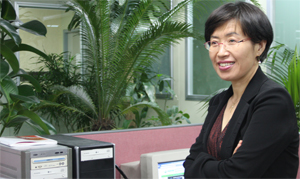
“Food is warm. Food is a memory. Through it, North and can become one,” said Lee Ae-ran (09’, Food Science and Technology), the first female doctor who is a North Korean defector. The mid-forty year old woman, who is dressed in a black two-piece suit with a red blouse and black heels, now adds a perfectly white apron to her ensemble. Standing before a group of 25 students at the
“This traditional North Korean dish is called Sagwajeon, meaning ‘apple pan-fried delicacies’. It contains high protein, yet little carbohydrate so it is very good for those who are on a diet,” said Lee. Since last March, Lee has taught 50 students at the Born in the North’s capital city of Lee’s life in the North was not so pleasant overall. Since Lee’s grandparents who were large landowners moved down to South before 1945, the record of the family showing her family is related to had always followed Lee. Although Lee was a hard working student with good academic grades, her low family background did not allow her to enroll in college. Luckily, however, new government policy fostering science departments gave Lee to chance to enroll college. After graduating from Life in Professor Lee of Ewha helped Lee get a full scholarship at Ewha and Lee did not miss the unusual chance of her lifetime. In fall 2002, Lee finally began studying at Ewha in the master’s program in Food Science and Technology under Professor Lee. Despite her determination and best efforts, Lee still struggled since she knew little English. “The first assignment I was given was translating an 80-page English text into Korean,” said Lee. “Since I had learned only Russian, I had no idea how to accomplish that task,” said Lee. For a whole month doing the homework, Lee often stayed up all night that she couldn’t even give a meal to her son. As Lee finished the assignment one month later, she reflected on her physical appearance, “My hair was tangled, my outfit was funny, and my teeth were not even brushed.” Struggling to learn English, Lee also faced another obstacle; understanding As Lee diligently practiced in both languages, and now she speaks perfect South Korean and fluent English. And after of the master's program, Lee wanted to study more in doctorate program. “I found a joy while studying. Learning something new everyday was an indeed rich experience,” said Lee. Closing her eight years of journey at Ewha, which sometimes tasted hot, sour, bitter, and sweet, Lee tells that it was not only her knowledge got improved while at Ewha, but also her heart was fulfilled with warm help from other Ewhaians. “The most important thing I learned from Ewha was the spirit that always welcomes to serve others. Whenever I had a hard time in anything, my classmates were always there to help me. From them, I learned a lot about caring for others. It is my No. 1 motto of my life,”said Lee.
Lee, now as a food science scholar at the

